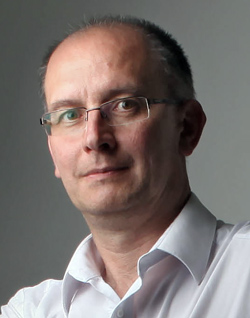
SPEAKER PROFILE |
 Prof. Adrian Ionescu EPFL SWITZERLAND |
The abrupt end of CMOS roadmap: quest for a more energy efficient switch
Abstract
The invention of the transistor more than 50 years ago triggered the creation of the semiconductor industry of today which underpins a substantial fraction of the world’s GDP. The semiconductor industry relies on solid-state silicon CMOS technologies that have continuously evolved via miniaturization over many orders of magnitude. However, the traditional scaling of MOSFET switch mainly addressed high performance figures of merit and not energy efficiency metrics. In this talk we will summarize the quest for a new electronic switch with particular focus on Tunnel FETs, NEM switches and Metal-Insulator-Transition switches for both Von-Neumann and neuromorphic computing.
Bio
Adrian M. Ionescu is a Professor at the Ecole Polytechnique Fédérale de Lausanne (EPFL), Switzerland. He received B.S./M.S. and Ph.D. degrees from the Polytechnic Institute of Bucharest, Romania and the National Polytechnic Institute of Grenoble, France, in 1989 and 1997, respectively. He held staff or visiting positions at LETI-Commissariat à l’Énergie Atomique, Grenoble, Stanford University, and at Tokyo Institute of Technology. He is the founder and director of the Nanoelectronic Devices Laboratory (Nanolab) of EPFL. Prof. Ionescu has published more than 400 articles in international journals and conference proceedings. He is the recipient of the 2013 IBM Faculty Award and of the André Blondel Medal 2009, SEE, Paris, France for contributions to the progress in electronic engineering sciences. He served on the International IEEE Electron Devices Meeting, IEEE VLSI and Transducers technical committees and he was the Technical Program Committee Chair/Co-Chair of the European Solid-State Device Research Conference in 2006 and 2013. He is an elected member of the Swiss Academy of Technical Sciences (SATW).